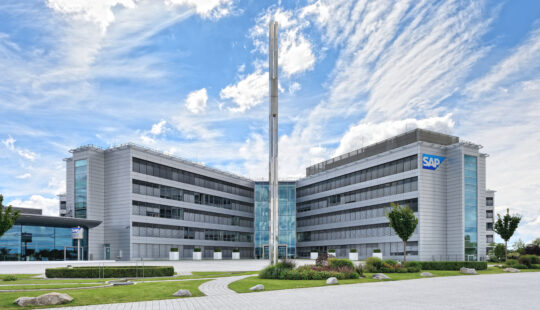The COVID-19 public health crisis has given new urgency to the discussion around mental health in the workplace. Since March 2020, employees have been coping with unprecedented levels of social disconnection, financial worries, insomnia, and anxiety about health and safety.
It is no secret that employees who are laboring under strain and emotional exhaustion carry this stress into the workplace, where it surfaces as reduced motivation, performance, and cognitive capabilities.
“Mental health was already identified as a critical employee concern prior to COVID-19,” says Dr. Autumn Krauss, chief scientist at SAP SuccessFactors. An organizational psychologist with a specialization in occupational health psychology, Krauss works with organizations to develop strategies that support employee well-being in a holistic sense. This includes mental health in the workplace, a topic that is receiving heightened attention in these challenging times. “I do see the issue being more serious and pervasive as mental health concerns have been exacerbated by the pandemic,” she says.
Even before the pandemic, the economic impact of poor mental health has been staggering. The World Health Organization (WHO) estimates that the loss of productivity from depression and anxiety cost the global economy 1 trillion dollars each year. However, there is hope in even the smallest actions. The WHO found that for every dollar invested in treatment for common mental health disorders, there is a return of four dollars in improved health and productivity.
Employers may be unclear about their role, or what their contribution should be, when it comes to supporting the mental health needs of their workforce. It can be difficult for managers to gauge how their employees are actually coping with stress, especially while many employees are working from home offices and have limited options to use vacation days. What’s an appropriate response? What’s off-limits?
SAP Offers Employees a Mental Health Day
When a recent employee pulse survey, powered by Qualtrics, revealed that one-third of SAP employees have stress levels that are higher than their satisfaction levels – with 61% reporting that they were working slightly above capacity – SAP responded by allocating a Mental Health Day on April 27 as a way to encourage employees to unwind and recharge.
SAP’s Mental Health Day is a company-sponsored global holiday for all employees to unplug from the office and reconnect with their families and other important areas of their lives that may be neglected, including physical health, hobbies, and social connections.
“As an SAP employee, I appreciate the recognition by our executive leadership on the importance of employee well-being and their investment in our mental health by allocating a working day to this cause across our entire global SAP workforce,” says Krauss. She advocates for sustaining the benefits from the company-wide holiday by fostering new ways of thinking and acting that promote mental health and well-being every day – so that “it’s just the way we do things around here.”

Resetting Company Culture: Creating a Safe Environment to Speak Up
Setting aside a day for employee mental health is just one strategy employers can take to support the well-being of their workforces. Each company’s approach will be as unique as its culture.
Regardless of the company’s size, geography, or demographics, however, the single most important thing managers can do to support their employees’ emotional well-being is to remove the stigma around mental health. This helps ensure that important conversations about employees’ mental health can happen as naturally as discussions about training and upskilling. It is imperative that employees feel it is safe to speak up and seek the help they need without fear of repercussions or consequences to their reputation or advancement opportunities.
When employees feel that they can be authentic about who they are, the result is often improved engagement, better performance, and better employee retention. This, however, requires a cross-organization commitment, with all managers on board in providing a psychologically safe environment for employees.
“I’m a firm believer that fostering positive mental health at work is not HR’s job,” Krauss says. “HR can provide resources for individuals to build better personal coping skills and get support, but HR would have no visibility into employees’ everyday behavior and how it might be changing as a first sign that they could be struggling with their well-being.”
Therefore, when crafting a mental health strategy, employers are advised to take a preventative approach, rather than a reactive approach, so that employees get the help they need before the appearance of serious negative mental health symptoms, such as depression and burnout. The overarching goal should be to not only reduce negative mental health, but also to foster positive mental health.
Krauss argues that it is the organizations’ responsibility to create the team norms, work environment, and culture that foster positive mental health. Employees should feel encouraged to raise their hands early if they are struggling and feel confident that their managers will recognize their distress, even if they don’t raise their hands.
Rather than relying solely on individual-focused policies, initiatives, or benefits, destigmatizing mental health in many organizations will require a reset of corporate culture starting at the executive level. As Krauss emphasizes, “This is only achieved by managers role modeling that they are investing in their own well-being, and well-being is important enough for a continuous dialogue with their team members.”
Join the Conversation on SAP Purpose Network Live
Connect with the experts who are moving business in new directions. Join SAP Purpose Network Live for an open discussion on the importance of fostering a company culture that supports the mental health of its employees and how to kick-start the conversation around mental health in your organization.
Starting the Conversation Around
Destigmatizing Mental Health in the Workplace
- Thursday, March 25, 2021
- 11:30 a.m. ET | 5:30 p.m. CET | 11:30 p.m. SGT
- Speakers:
- Waheeda Rahman White, director, Engagement, Inclusion and Mental Health, Bell
- Laurie Ruettimann, author and HR consultant, Punk Rock HR
- Dr. Autumn D. Krauss, chief scientist, SAP SuccessFactors HR Research Team, SAP
- Kim Lessley, moderator, global director, Solution Marketing, SAP



